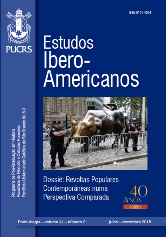La violencia, agitación global, y el capitalismo avanzado: los disturbios británicos de 2011
DOI:
https://doi.org/10.15448/1980-864X.2015.2.21302Palabras clave:
Inglaterra, disturbios, protesta política, democracia occidental.Resumen
En los últimos cinco años, hemos sido testigos de las formas crecientes de violencia e inestabilidad en todo el mundo. En los medios de comunicación, las representaciones de la violencia se presentan como acciones de resistencia a los regímenes opresivos y políticos corruptos, pero son, sin embargo, al mismo tiempo, desconectadas de una política global que se derrumba en muchos aspectos: la inestabilidad del mercado, aumento de la austeridad, el desempleo y la marginación; tal vez un señal de que la orgia de la globalización está llegando a su punto culminante. Todo esto se ha reflejado en varias ciudades inglesas en 2011. En este artículo analizo estas manifestaciones – por qué acorrieran y cuál fue la respuesta del Estado – y sin embargo, también la forma en que deben ser considerados como parte de otras formas de violencia y el descontento contra los regímenes políticos opresivos y la política corrupta, como una respuesta colectiva a un sistema global al borde del colapso – en Europa, el Medio Oriente o América Latina – es decir, como resultado de la desenfrenada búsqueda sin fin de lucro a costa de millones de personas.
Descargas
Citas
ANGEL, H. Were the riots political? In: Safer Communities Special Edition on the riots, v. 11, p. 24-32, 2012.
BAUMAN, Z. Work, consumerism and the new poor. New York: Open University Press, 2005.
BENYON, J. Scarman and After: Essays reflecting on Lord Scarman’s Report , the riots and their aftermath. London: Pergamon Press, 1984.
BODY-GENDROT, S. Disorder in world cities: Comparing Britain and France. Cited online at <http://www.opendemocracy.net/ourkingdom/sophie-body-gendrot/disorder-in-world-cities-comparing-britainand-france?utm_source=feedblitz&utm_medium=FeedBlitzEmail&utm_content=201210&utm_campaign=Nightly_2011-08-16%2005:30>.
BRIGGS, D. The English Riots of 2011: A Summer of Discontent. Hampshire: Waterside Press, 2012a.
BRIGGS, S. Rurality and the riots: From the Panel to the Village Pub. In: Briggs , D. (Ed.). The English Riots of 2011: A Summer of Discontent. Hampshire: Waterside Press, 2012b. p. 303-325. Guardian and LSE. Reading the riots: Investigating England’s Summer of Disorder. London, 2011.
HALL, S.; WINLOW, S.; ANCRUM, C. Criminal Identities and Consumer Culture: Crime, Exclusion and the New Culture of Narcissism. Cullompton: Willan, 2008.
MORRELL, G.; SCOTT, S.; MCNEISH, D.; WEBSTER, S. The August riots in England: Understanding the involvement of young people. London: National Centre for Social Research, 2011.
MOXON, D. Consumer culture and the riots of 2011. In: Sociological Research Online, v. 16, 2011.
PEARSON, G. Hooligan: A history of respectable fears. 1983.
SOLOMOS, J. Race, rumours and riots: Past, present and future. In: Sociological Research Online, v. 16, 2011.
LEA, J. Shock horror: Rioters cause riots! Criminals cause crime. British Society of Criminology Newsletter, n. 69, Winter 2011.
SCARMAN, Lord. J. The Brixton Disorders, 10-12th April (1981). London: HMSO, 1981.
TREADWELL, J.; BRIGGS, D.; WINLOW, S.; HALL, S. Shopocalypse Now: Consumer Culture and the English Riots of 2011. In: British Journal of Criminology, v. 53, 2013.
VEBLEN, T. The theory of the leisure class. Harmondsworth: Penguin, 1994.
ŽIŽEK, S. Living in the End Times. London: Verso Books, 2011.
Descargas
Publicado
Cómo citar
Número
Sección
Licencia
Derechos de Autor
La sumisión de originales para la Estudos Ibero-Americanos implica la transferencia, por los autores, de los derechos de publicación. El copyright de los artículos de esta revista es el autor, junto con los derechos de la revista a la primera publicación. Los autores sólo podrán utilizar los mismos resultados en otras publicaciones indicando claramente a Estudos Ibero-Americanos como el medio de la publicación original.
Creative Commons License
Excepto donde especificado de modo diferente, se aplican a la materia publicada en este periódico los términos de una licencia Creative Commons Atribución 4.0 Internacional, que permite el uso irrestricto, la distribución y la reproducción en cualquier medio siempre y cuando la publicación original sea correctamente citada.






